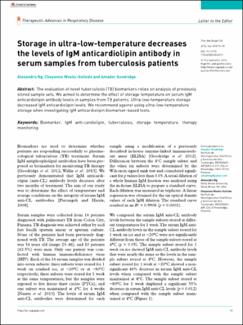| dc.contributor.author | Ng, Alexandra | |
| dc.contributor.author | Weeks-Galindo, Cheyenne | |
| dc.contributor.author | Goodridge, Amador | |
| dc.date.accessioned | 2020-06-30T23:23:57Z | |
| dc.date.available | 2020-06-30T23:23:57Z | |
| dc.date.issued | 2014-06-01 | |
| dc.identifier.other | DOI: 10.1177/ 1753465814534911 | |
| dc.identifier.uri | http://repositorio-indicasat.org.pa/handle/123456789/145 | |
| dc.description | The evaluation of novel tuberculosis (TB) biomarkers relies on analysis of previously stored sample sets. We aimed to determine the effect of storage temperature on serum IgM anticardiolipin antibody levels in samples from TB patients. Ultra-low-temperature storage decreased IgM anticardiolipin levels. We recommend against using ultra-low-temperature storage when investigating IgM anticardiolipin biomarker-based tests. | en_US |
| dc.description.abstract | The evaluation of novel tuberculosis (TB) biomarkers relies on analysis of previously stored sample sets. We aimed to determine the effect of storage temperature on serum IgM anticardiolipin antibody levels in samples from TB patients. Ultra-low-temperature storage decreased IgM anticardiolipin levels. We recommend against using ultra-low-temperature storage when investigating IgM anticardiolipin biomarker-based tests. | en_US |
| dc.language.iso | eng | en_US |
| dc.rights | info:eu-repo/semantics/openAccess | |
| dc.subject | Biomarker | en_US |
| dc.subject | IgM anti-cardiolipin | en_US |
| dc.subject | tuberculosis | en_US |
| dc.subject | storage temperature | en_US |
| dc.subject | therapy monitoring | en_US |
| dc.title | Storage in ultra-low-temperature decreases the levels of IgM anticardiolipin antibody in serum samples from tuberculosis patients | en_US |
| dc.type | info:eu-repo/semantics/article | en_US |
| dc.type | info:edu-repo/semantics/publishedVersion | |

